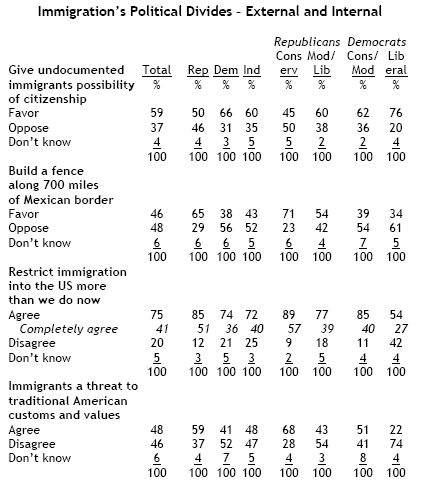by Carroll Doherty, Associate Director, Pew Research Center for the People & the Press
With his renewed push for a comprehensive immigration bill, President Bush is advancing a potentially powerful political wedge issue, but one with an unlikely twist: Immigration fractures the president’s own party at least as much as it divides the opposition.
Pew’s major political values survey, released March 22, found substantial gaps within the two parties — and between them — over key elements of immigration policy and the impact of immigrants on the United States.

The public generally continues to favor a proposal to allow undocumented immigrants who have been in the United States for several years to gain legal working status and the possibility of future citizenship. About six-in-ten (59%) support this idea, about the same number as recorded in an April 2006 survey (58%). Most moderate and liberal Republicans (60%) favor the path to citizenship, but just 45% of conservative Republicans agree.
Democrats also differ over a proposed path to citizenship for illegal immigrants, though solid majorities of both liberal Democrats (76%) and conservative and moderate Democrats (62%) favor this approach.
Bush said the government’s stepped up enforcement measures, including a new fence along the Mexican border, have cut down on the number of illegal immigrants entering the country. The border fence is more contentious among Republicans than Democrats: Fully 71% of conservative Republicans support construction of a 700-mile border fence, compared with 54% of moderate and liberal Republicans. By comparison, there is less of an ideological split among Democrats (61% of liberal Democrats oppose a border fence as do 54% of conservatives and moderates).
Yet what may be more striking are the internal partisan differences in attitudes about levels of immigration and whether immigrants undermine the nation’s cultural values. Overall, three-quarters of Americans agree that “we should restrict and control people coming into our country to live more than we do now.” Views on this statement have not changed appreciably since 1992. But within the parties opinions are sharply divided.
On this question, Democrats are far more divided than Republicans. Indeed, conservative and moderate Democrats are much closer to conservative Republicans than to liberal Democrats in their opinions on restricting the number of people coming into the country; fully 85% of conservative and moderate Democrats favor greater controls on immigration, compared with 89% of conservative Republicans and just 54% of liberal Democrats.
Immigrants a Cultural Threat?

Both parties are internally divided over whether immigrants threaten American customs, but the GOP’s intraparty differences have increased dramatically in the past few years. Fully 68% of conservative Republicans agree that “the growing number of newcomers from other countries threatens traditional American customs and values.” This compares with just 43% of moderate and liberal Republicans.
Four years ago, conservative Republicans and the party’s moderates and liberals generally shared the same view about this statement (54% vs. 59%, respectively); today the gap between the two groups’ opinion on the cultural threat is 25 points (68% vs. 43%). Democratic divisions are approximately as wide, but the opening of the gap is not as recent. More than twice as many conservative and moderate Democrats (51%) as liberal Democrats (22%) say newcomers to the U.S. threaten American customs, but that was also pretty much the case in 2003 and 2002.




